College of Nursing celebrates collaboration with northern partner
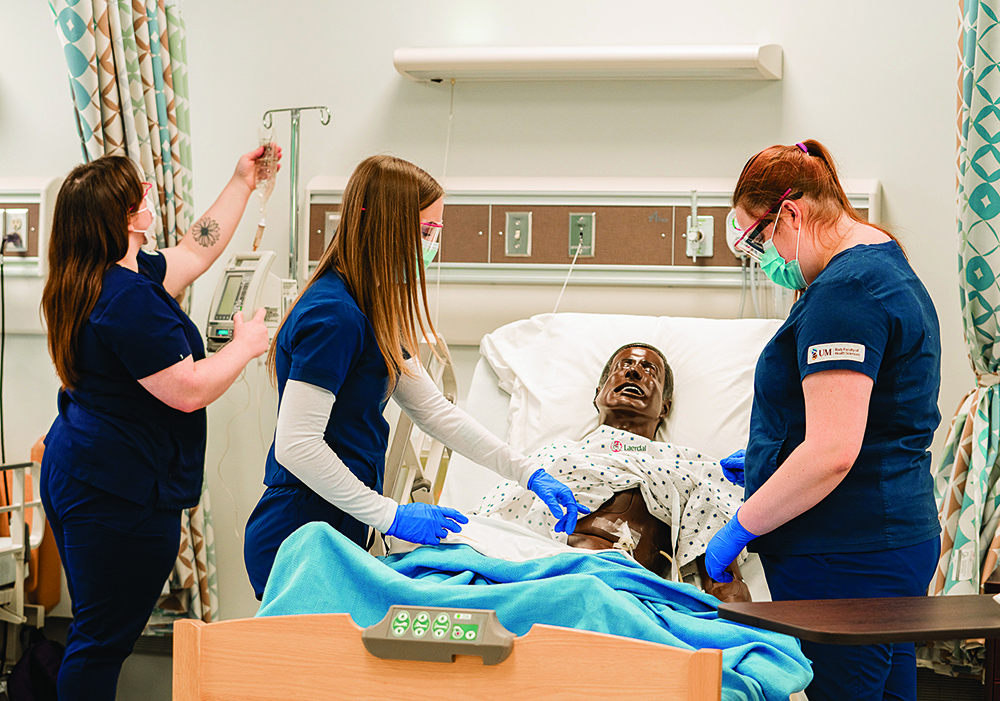
The College of Nursing is marking 25 years of partnership with University College of the North (UCN).
The two institutions have collaborated to deliver UM’s bachelor of nursing program to students in the northern Manitoba communities of The Pas and Thompson since 1998, when UCN was known as Keewatin Community College.
Over the years, 543 nurses have graduated from the UCN cohort. There are currently 96 students enrolled, 32 of whom are First Nations or Métis.
Twenty students in total are admitted each September in The Pas and Thompson. Most work in northern communities after they graduate, said Helga Bryant, dean of health at UCN’s Faculty of Health.
“I firmly believe that if students are educated in the north, they will stay in the north,” Bryant said. “We have a very good relationship with our major employers of registered nurses in the north.”
Dr. Netha Dyck [BN/88], UM dean of nursing, said the partnership has been a remarkable success. “We look forward to working collaboratively in addressing the ongoing need for more nurses in northern Manitoba,” she said.
Scholar analyzes data from pandemic pregnancies
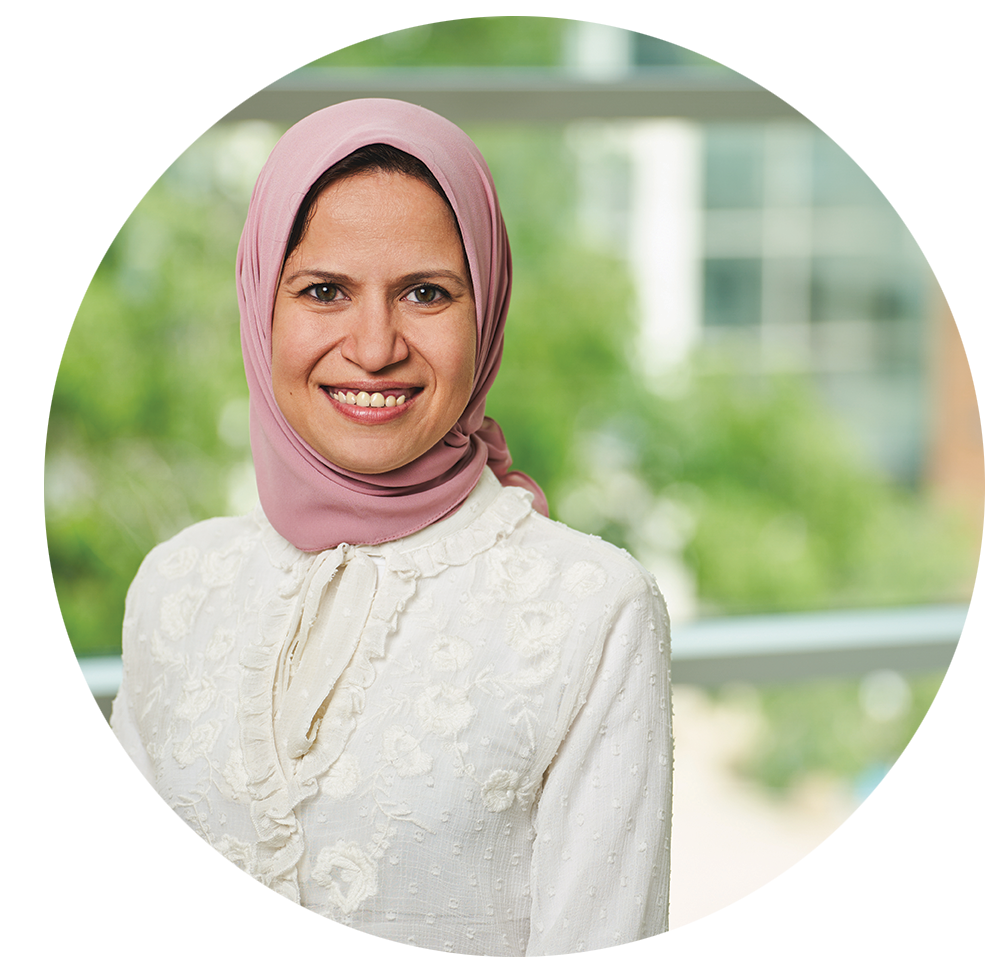
Dr. Laila Aboulatta is one of four PhD students at UM who received prestigious 2023 Vanier Canada Graduate Scholarships.
Vanier scholars are chosen for their academic excellence, research potential and leadership. They receive $150,000 over three years to support their research.
Aboulatta, who earned her doctor of pharmacy degree in Egypt, is pursuing her UM doctorate at the College of Pharmacy in pharmacoepidemiology – the study of the use, safety and effectiveness of drugs in large groups of people.
With her Vanier scholarship supported by the Canadian Institutes of Health Research, she is analyzing Manitoba health data, focusing on linked mother-infant records from pregnancies that occurred during the pandemic lockdown.
“The purpose of my research is to gain insight into the adequacy of health-care delivery during the challenging times of the pandemic,” she said. “We also aim to investigate trends in the use of medications among pregnant people.”
Aboulatta said her long-term goal is to establish her own lab and a network to support young pharmacoepidemiologists and other researchers.
Event highlights importance of queer health services
Caring Queerly, the first Rady Faculty symposium on queer health, was held in October on the Bannatyne campus.
More than 60 people registered for the two-day symposium, which included a public keynote lecture, student presentations and a drag performance.
“I wanted to make sure there was space for queer joy and queer knowledge translation,” said Mikayla Hunter, founding president of the Queer & Trans Health Sciences Graduate Student Group.
Hunter, a master’s student in community health sciences, organized the gathering with Dr. Deborah McPhail [BA/01], an associate professor in the same department.
Dr. Jake Pyne, a faculty member at the York University School of Social Work, gave the keynote lecture on the challenges faced by transgender youth. “Trans youth, especially those who are further into the margins, need our help to be free,” Pyne said.
Another presentation addressed gender diversity and sexual orientation in cancer health services research.
“There are a lot of health inequities faced by the queer and trans communities, so it’s really important that we [held] the symposium … where people study to be nurses and doctors and social policy analysts,” Hunter said.
Student-led wheelchair program boosts kids’ confidence
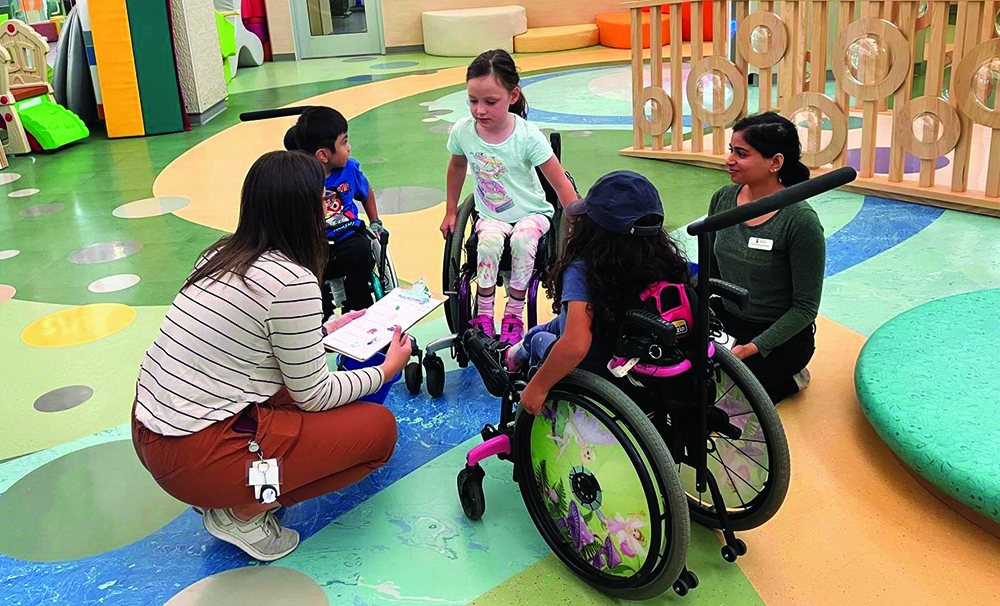 Two occupational therapy students developed a training camp that promotes self-reliance and a sense of community for children who use wheelchairs.
Two occupational therapy students developed a training camp that promotes self-reliance and a sense of community for children who use wheelchairs.
It’s the first formal wheelchair skills training program to be offered at Winnipeg’s Rehabilitation Centre for Children.
Students Keerthana Kalliat [MOT/23] and Lexie Rea [B.H.Sc./20, MOT/23] conceived the camp, dubbed “Wicked Wheels,” as part of their final advanced fieldwork placement.
“Usually when kids are prescribed wheelchairs, they may receive some basic training,” said Kalliat. “But more advanced skills, such as getting up a ramp or getting over obstacles, are harder to teach during wheelchair appointments.”
The camp, totalling eight hours of intense-but-fun training over several sessions, was led by Kalliat, Rea and two teenage mentors who are wheelchair users. “We ended a lot of our sessions with a game of tag, which the kids loved playing,” said Rea.
The UM students, who have now graduated, hope the centre will keep Wicked Wheels rolling. They said the most striking takeaway was the kids’ increased confidence.
“They were really proud of what they could do,” said Rea.
Honoree ‘pays it forward’ through humanitarian dentistry
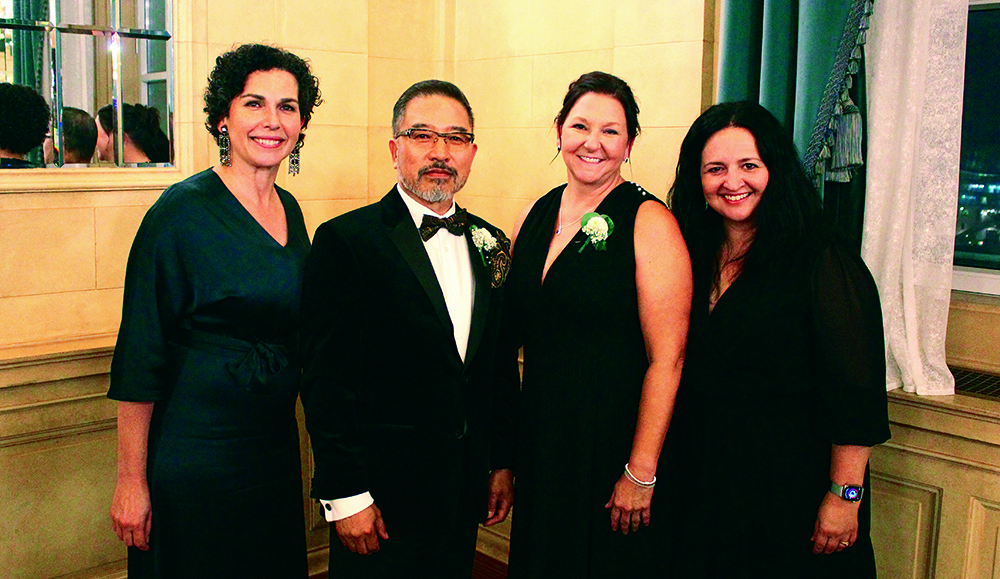
Aaron Kim [B.Sc./82, DMD/87], associate professor of restorative dentistry, received the Alumni of Distinction Award from the UM Dental Alumni Association at a gala in September.
Kim organizes humanitarian dental missions and has led the establishment of dental clinics in Zambia, Zimbabwe and Guatemala.
“I have been blessed with so many good people in my life,” Kim said. “I cannot pay back all the love and blessings you have given me; I can only pay it forward.”
Kellie Watson [Dip.D.Hyg./95] received the Alumni of Distinction Award from the UM School of Dental Hygiene Alumni Association.
Watson was the inaugural executive director of the College of Dental Hygienists of Manitoba and taught at the UM School of Dental Hygiene. She has also led the Saskatchewan Dental Hygienists Association and been a faculty member at the University of Saskatchewan.
“I was really so fortunate to receive my education from this institution,” Watson said. “It certainly provided me with a strong foundation [and with] guidance and mentorship from so many exceptional faculty.”
Gerald Niznick [DMD/66, D.Sc./02], benefactor of the Dr. Gerald Niznick College of Dentistry, and his wife were guests at the gala, which also paid tribute to the Classes of 1971 and 1973.
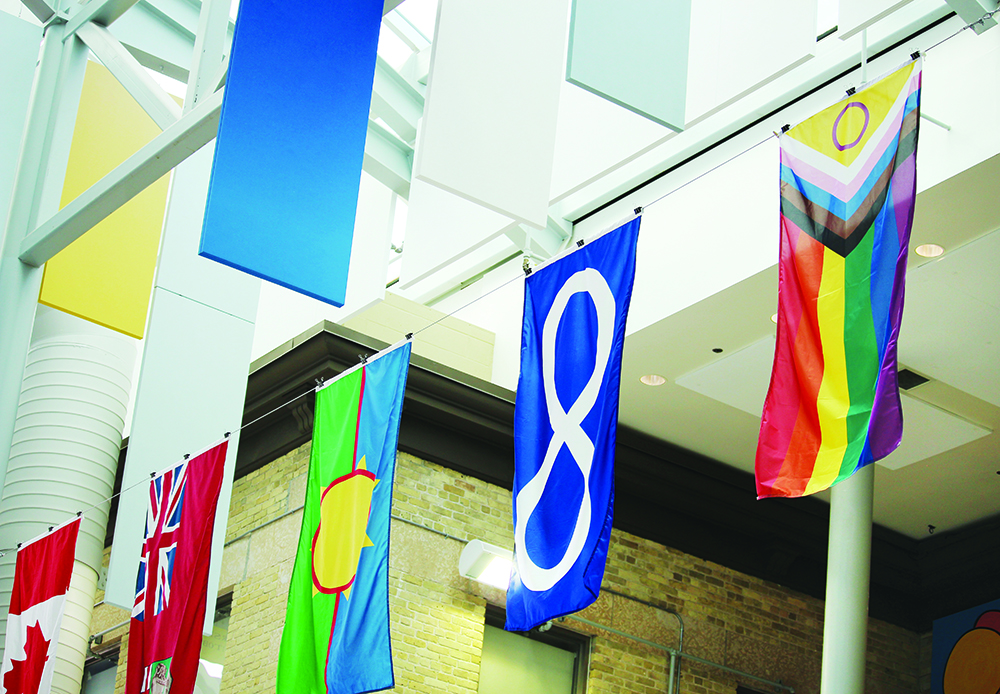
The Pride flag now has a permanent home on the Bannatyne campus, above the stage in the Brodie Centre atrium.
“I’m proud of the movement we’ve created, and I’m proud of our youth that are coming up,” said Elder Charlotte Nolin at a ceremony to unveil the flag in September.
“[The flag] shows to our campus community that the Rady Faculty is committed to being an inclusive and welcoming space for all,” said Peter Nickerson [B.Sc.(Med.)/86, MD/86], dean of the Rady Faculty.
New building to create space for historic expansion

A new building on the Bannatyne campus will provide space for the growing enrolment at UM’s medical college, it was announced in August.
The provincial government committed $40 million toward the multi-storey structure, planned for a site just west of the current dentistry building.
Slated for completion in 2027, the building will house classrooms, simulation labs and theatres for medical education.
It will also be home to the Dr. Gerald Niznick College of Dentistry’s dental clinics (read more on page 13), as well as Ongomiizwin – Indigenous Institute of Health and Healing and a 90-space child-care centre.
UM President and Vice-Chancellor Dr. Michael Benarroch described the planned medical education facilities as “state-of-the-art learning spaces that support student success and the delivery of health care.”
In 2023, the Max Rady College of Medicine expanded the size of the incoming class from 110 to 125 MD students – the largest medical class in UM history. By 2025, the annual intake will increase to 140.
Peter Nickerson [B.Sc.(Med.)/86, MD/86], dean of the Rady Faculty, said provincial investment in postgraduate expansion will also play a key role in enhancing health-care delivery.
UM will add 10 seats to the International Medical Graduate program and 30 seats (over two years) to new residency positions aimed at internationally educated medical graduates. Funding has also been committed to 169 new residency positions across disciplines over the next seven years.
UM-developed ‘smart glove’ shows promise
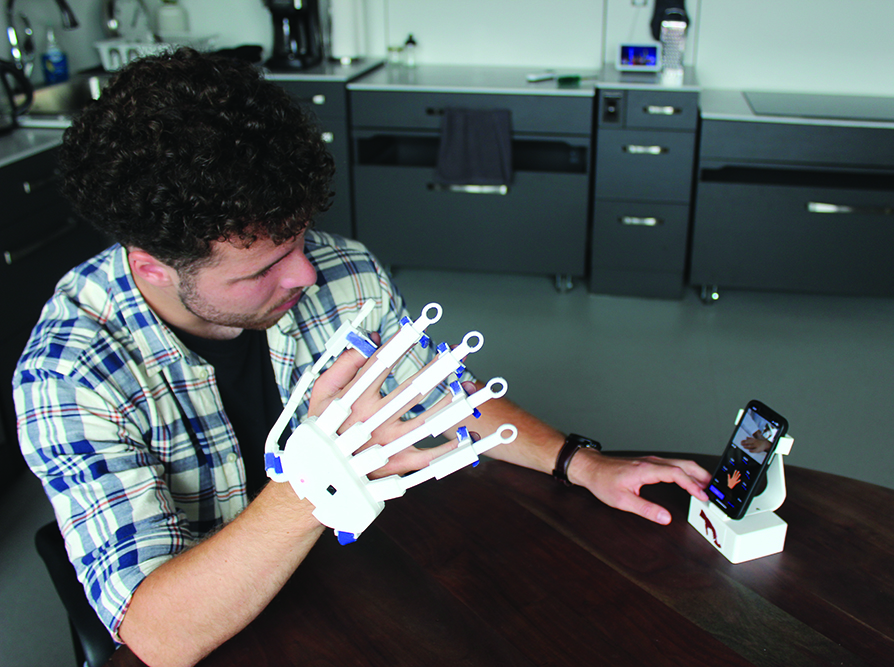
As part of an international scholarship, Silas Müller, a biomedical engineering student from Germany, spent the summer at UM testing a new tool designed to help people who need physical therapy on their hands.
The tool, a “smart glove” called iManus, was developed by Dr. Amine Choukou, associate professor of occupational therapy, along with Tactile Robotics, a start-up housed at the UM Smartpark.
The light plastic glove, outfitted with sensors, works via Bluetooth and a smartphone app to connect a patient with a therapist virtually.
On their mobile device the patient can see the therapist, as well as a computerized image of their hand and the movements they are doing. The therapist sees more detailed hand movements and can download a report with precise measurements, such as the range of motion of each finger.
The app comes with nearly 100 customizable exercises. The testing so far has focused on post-stroke therapy, but the technology can also be used for people with hand injuries or illnesses such as Parkinson’s disease.
“The next step is larger-scale clinical testing so the technology can be commercialized,” said Choukou.
Dr. Joseph Kaufert, professor emeritus of community health sciences, passed away in October at the age of 80.
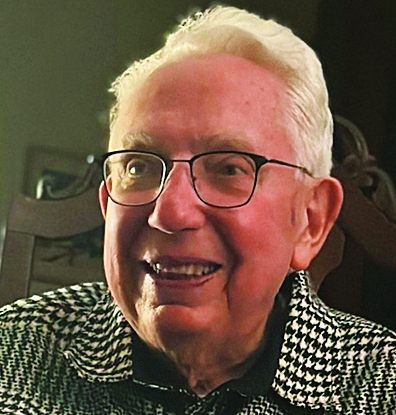 The Minnesota-born social scientist did influential work in medical anthropology, public and population health, Indigenous health, disability studies, health communication, and biomedical and research ethics.
The Minnesota-born social scientist did influential work in medical anthropology, public and population health, Indigenous health, disability studies, health communication, and biomedical and research ethics.
He contributed to Canadian policy development on ethical issues, including informed consent, organ donation and end-of-life care.
Kaufert and his wife, the late Dr. Patricia Kaufert, were colleagues who developed and co-directed UM’s master’s and PhD programs in community health sciences.
Nursing students unite in support of Orange Shirt Day
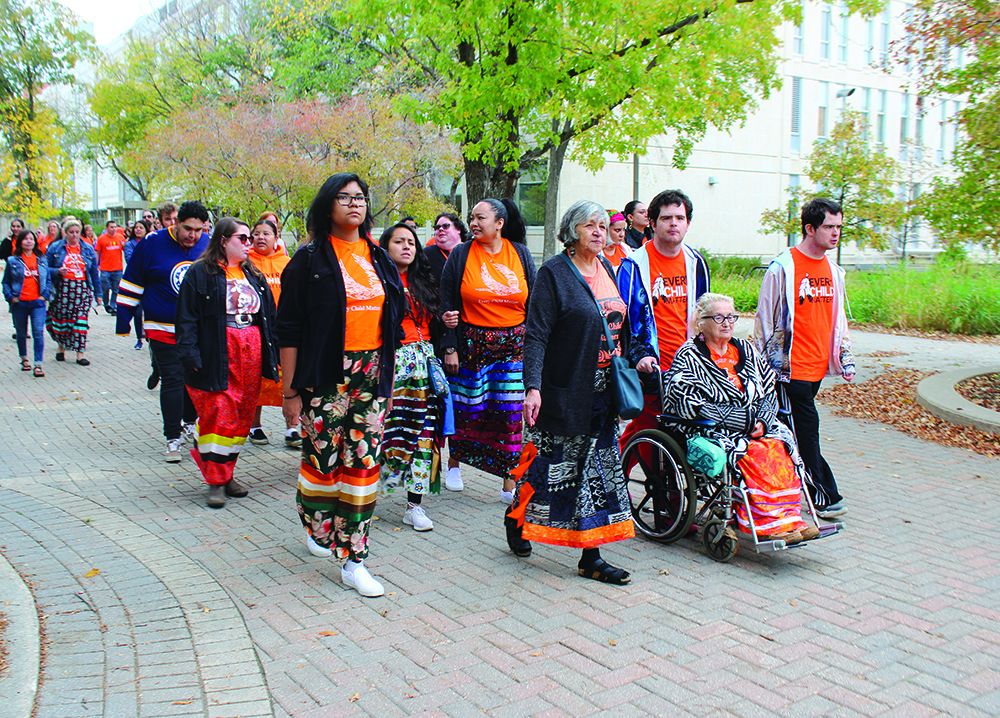 In September, hundreds of people took part in the annual Orange Shirt Day (National Day for Truth and Reconciliation) Walk on the Fort Garry campus, organized by the Nursing Students’ Association (NSA).
In September, hundreds of people took part in the annual Orange Shirt Day (National Day for Truth and Reconciliation) Walk on the Fort Garry campus, organized by the Nursing Students’ Association (NSA).
The walk, which commemorates the tragic legacy of residential schools, began with a hopeful message from Elder Donna Green, a residential school survivor.
“One of the strongest commonalities that we all have is our spirit,” Green said. “We are all human; we all enjoy respect, consideration, dignity and acceptance. That is what will bind us together.”
Dr. Netha Dyck [BN/88], dean of nursing, commended the NSA for its role in raising awareness and committing to a better future.
“When our students held their inaugural Orange Shirt Day nine years ago, they made a pledge to provide culturally safe nursing care, to create an environment that supports, affirms and celebrates all people, and to be positive role models,” she said.
The walk ended at the National Centre for Truth and Reconciliation. The day’s events also included a Teach-In for Reconciliation.
Dentistry alum shows gratitude through gifts
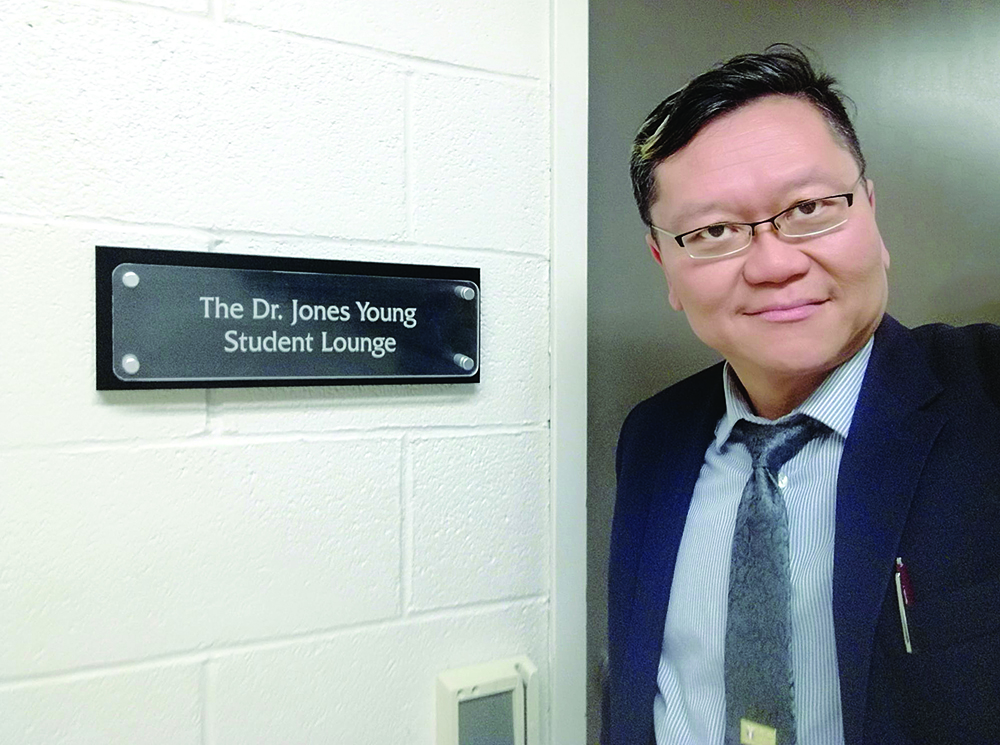 Dentistry alum Jones Young [DMD/87] has made an endowed gift to the UM dental college, leaving a legacy to support future students.
Dentistry alum Jones Young [DMD/87] has made an endowed gift to the UM dental college, leaving a legacy to support future students.
Young, who lives in Coquitlam, B.C., recently retired from practice and donated $50,000 to establish the Dr. Jones and Katie Young Scholarship in Dentistry.
Starting in 2024-25, scholarships will be awarded to one third-year and one fourth-year student at the Dr. Gerald Niznick College of Dentistry each academic year.
UM gave Young the foundation for a great career, he said. “To enjoy your work and to truly love it, you need to be well-equipped in terms of knowledge, skill, experience and equipment. I am grateful that UM gave me that.”
Young has been a loyal donor to the dental college. In 2012, he contributed $250,000 to renovate the student lounge, a space where he had developed lasting friendships. The lounge, now named after him, provides a welcoming place for dentistry and dental hygiene students to connect and recharge.
“I hope what I’ve done has an impact,” the philanthropist said. “I saw other alumni doing it and I thought, ‘Maybe it’s my turn to give back.’”
WISDOM symposium addresses equity in research
Scientists are making progress at incorporating sex-based analysis into biomedical and health research.
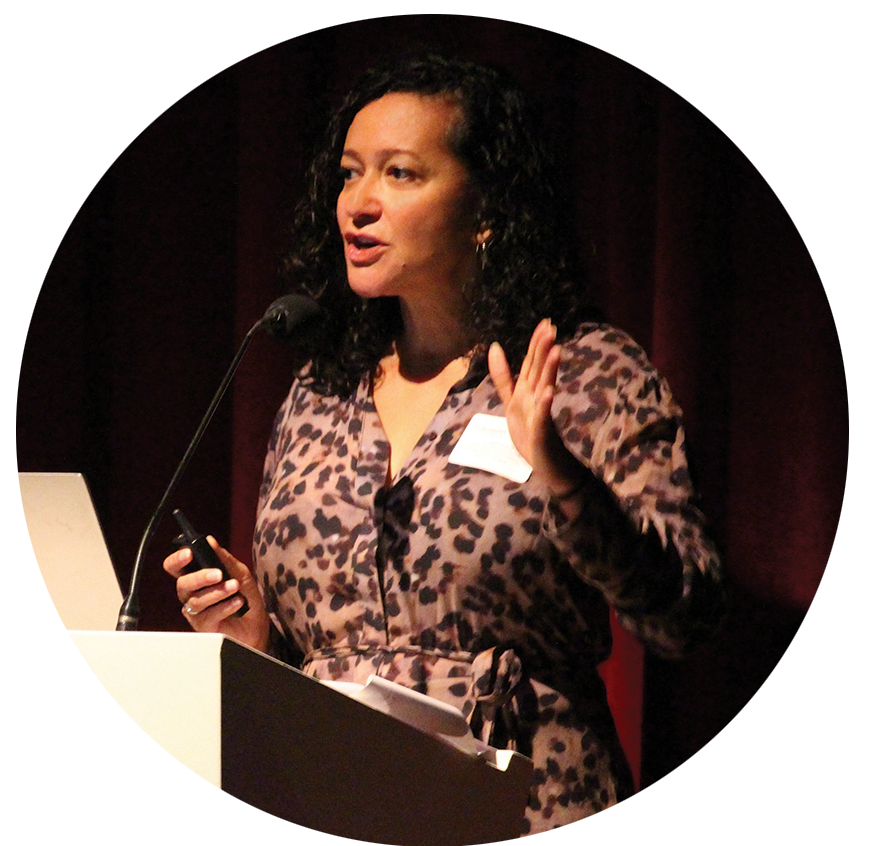
But speakers at an equity symposium in September emphasized that for research to be fully equitable, researchers must take into account gender, as well as biological sex. Gender-diverse people should not be excluded from research, they said.
Dr. Sofia Ahmed, a kidney specialist from the University of Alberta, spoke about the need for research to optimize transgender health, noting that there is virtually no data on how gender-affirming hormone therapies affect kidney function, the cardiovascular system and other aspects of health.
“This is a social justice issue,” she said.
The symposium was held by Women in Science: Development, Outreach and Mentoring (WISDOM), an organization supported by the Rady Faculty of Health Sciences.
“How we collect our data, who we include in our studies, what questions we pursue, whose voices we listen to and whose voices we render silenced – all of these questions [are] absolutely critical,” said keynote speaker Dr. Angela Kaida, scientific director of the Institute of Gender and Health, part of the Canadian Institutes of Health Research.
Exceptional grad students earn Dean’s Prize
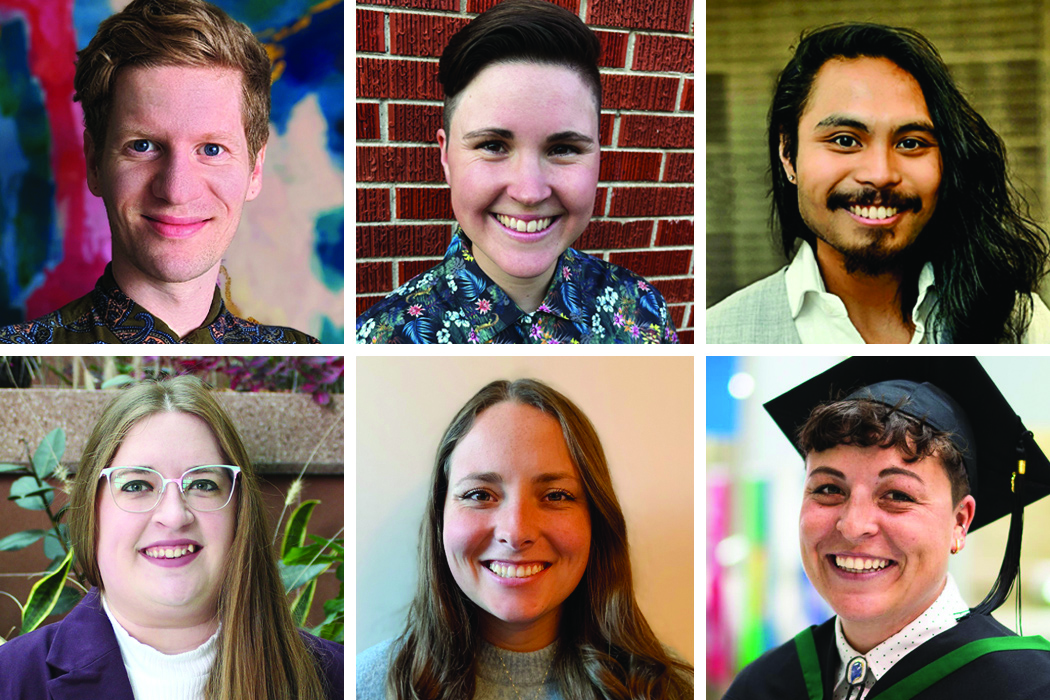
Six master’s or doctoral students were awarded the Dean of the Rady Faculty of Health Sciences Graduate Student Achievement Prize in 2023. The prize recognizes exceptional academic achievement, notable personal service and leadership.
Adam Brandt, a master’s student in the College of Nursing, aims to uplift the voices and experiences of 2SLGBTQIA+ nurses in order to improve their work environments and patient care.
Jess Crawford, a master’s student in the College of Nursing, is exploring gender inclusion and affirmation in nursing education, with a goal of equity for people of all genders.
Mikayla Hunter, a master’s student in community health sciences in the Max Rady College of Medicine, is researching the primary health-care experiences and needs of 2SLGBTQIA+ young adults.
Nolan De Leon [B.Sc./19], an MD/PhD student in the Max Rady College of Medicine, is studying how circular ribonucleic acids contribute to the development of congenital diaphragmatic hernia.
Amy Kreshewski [B.Kin./21, MOT/23], who received her master of occupational therapy from the College of Rehabilitation Sciences, completed a project on rural and remote wheelchair service delivery.
Elysa Sandron [MOT/23], who received her master of occupational therapy from the College of Rehabilitation Sciences, completed a project on culturally safe practice with Indigenous populations.
Student with passion for equity wins Hall of Fame award
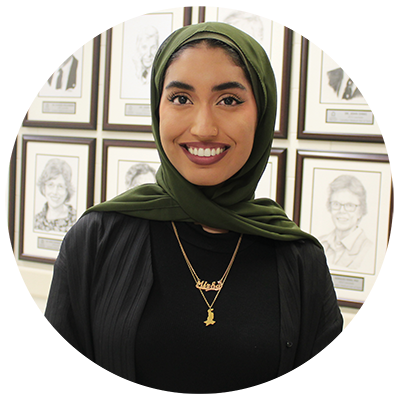 Mirha Zohair [B.Sc./21] is the 2023 recipient of the Canadian Medical Hall of Fame Award.
Mirha Zohair [B.Sc./21] is the 2023 recipient of the Canadian Medical Hall of Fame Award.
The honour goes to one second-year student at each Canadian medical school who demonstrates community leadership, superior communication skills and an interest in advancing knowledge.
Zohair, a first-generation Pakistani immigrant, has served as the equity, diversity and inclusion (EDI) representative for the Manitoba Medical Students’ Association. She co-organized UM’s first EDI and global health conference, held in early 2023.
Now vice-stick EDI senior at the medical college, she provides a student perspective on the school’s admissions committee, assists in developing anti-racism polices on the Rady Faculty EDI committee and serves on the Doctors Manitoba Speaker Series planning committee.
Zohair helped to establish a prayer space for Muslim students on the Bannatyne campus as part of her commitment to equity and inclusion.
“I got involved in the Muslim Medical Association of Canada’s UM chapter to help ensure that Muslim students feel represented and accepted on campus,” she said.
College of Pharmacy to launch micro-credential for working pharmacists
Practising pharmacists will soon have the opportunity to earn a micro-certificate in advanced patient care through the College of Pharmacy.
The three-course, 36-hour Essentials in Advanced Patient Care for Pharmacists micro-certificate program will be delivered online by pharmacy content experts. It will focus on developing practical skills to address increasingly complex patient needs in diverse practice settings.
“This program will equip pharmacists with the knowledge, skills and competencies to confidently provide the latest evidence-based care to diverse patient populations,” said Dr. Ruchi Kumra, director of professional development at the College of Pharmacy.
Licensed pharmacists will be able to include this continuing education opportunity as accredited learning under requirements by the College of Pharmacists of Manitoba.
One of the courses will develop expertise in evaluating scientific literature and applying its findings to appropriate patient populations. Another will hone skills in patient assessment to ensure optimal patient-centred care.
“The third course will sharpen critical thinking and problem-solving skills in complex patient scenarios,” Kumra said. “We look forward to engaging with many of our alumni as they pursue the micro-certificate.”
The college plans to open registration for the program in mid-2024.
Visit the college website for more information.
